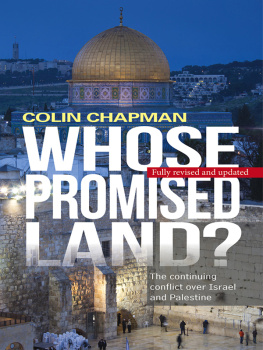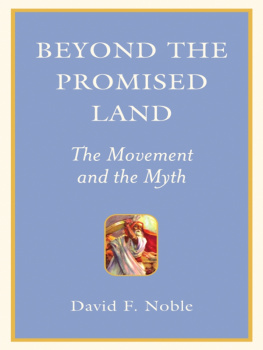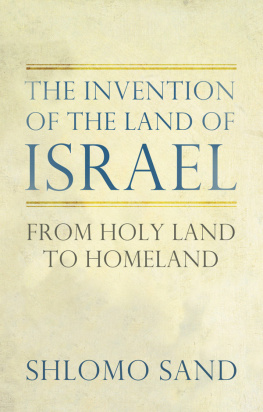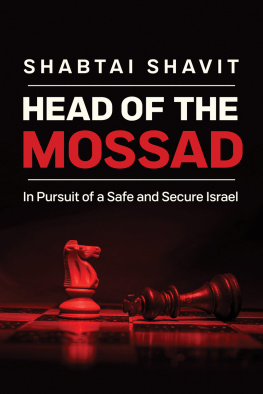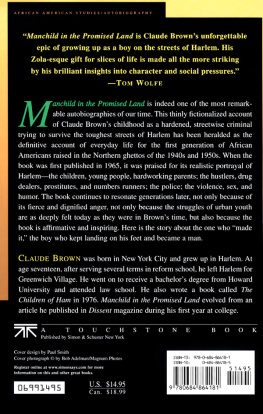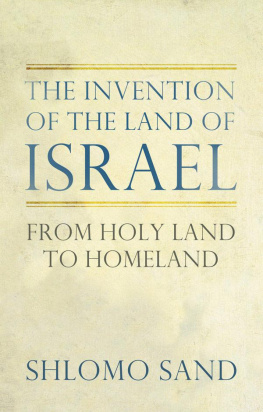Ari Shavit - My Promised Land: The Triumph and Tragedy of Israel
Here you can read online Ari Shavit - My Promised Land: The Triumph and Tragedy of Israel full text of the book (entire story) in english for free. Download pdf and epub, get meaning, cover and reviews about this ebook. year: 2013, publisher: Spiegel & Grau, genre: Art. Description of the work, (preface) as well as reviews are available. Best literature library LitArk.com created for fans of good reading and offers a wide selection of genres:
Romance novel
Science fiction
Adventure
Detective
Science
History
Home and family
Prose
Art
Politics
Computer
Non-fiction
Religion
Business
Children
Humor
Choose a favorite category and find really read worthwhile books. Enjoy immersion in the world of imagination, feel the emotions of the characters or learn something new for yourself, make an fascinating discovery.

- Book:My Promised Land: The Triumph and Tragedy of Israel
- Author:
- Publisher:Spiegel & Grau
- Genre:
- Year:2013
- Rating:3 / 5
- Favourites:Add to favourites
- Your mark:
- 60
- 1
- 2
- 3
- 4
- 5
My Promised Land: The Triumph and Tragedy of Israel: summary, description and annotation
We offer to read an annotation, description, summary or preface (depends on what the author of the book "My Promised Land: The Triumph and Tragedy of Israel" wrote himself). If you haven't found the necessary information about the book — write in the comments, we will try to find it.
Ari Shavit: author's other books
Who wrote My Promised Land: The Triumph and Tragedy of Israel? Find out the surname, the name of the author of the book and a list of all author's works by series.
My Promised Land: The Triumph and Tragedy of Israel — read online for free the complete book (whole text) full work
Below is the text of the book, divided by pages. System saving the place of the last page read, allows you to conveniently read the book "My Promised Land: The Triumph and Tragedy of Israel" online for free, without having to search again every time where you left off. Put a bookmark, and you can go to the page where you finished reading at any time.
Font size:
Interval:
Bookmark:


Copyright 2013 by Ari Shavit
Map copyright 2013 by Mapping Specialists Ltd.
All rights reserved.
Published in the United States by Spiegel & Grau, an imprint of The Random House Publishing Group, a division of Random House LLC, a Penguin Random House Company, New York.
S PIEGEL & G RAU and the H OUSE colophon are registered trademarks of Random House LLC.
Portions of this work were originally published in different form in Haaretz and The New York Review of Books.
All credits for permission to reproduce photographs can be found on .
Library of Congress Cataloging-in-Publication Data
Shavit, Ari.
My promised land / Ari Shavit.
p. cm.
ISBN 978-0-385-52170-3
eBook ISBN 978-0-8129-8464-4
1. Arab-Israeli conflict. 2. IsraelPolitics and government. I. Title.
DS119.7.S381877 2013
956.054dc23 2012046122
www.spiegelandgrau.com
Jacket design: Greg Mollica
Jacket photograph: Daniel Hundven-Clements/GalleryStock
v3.1
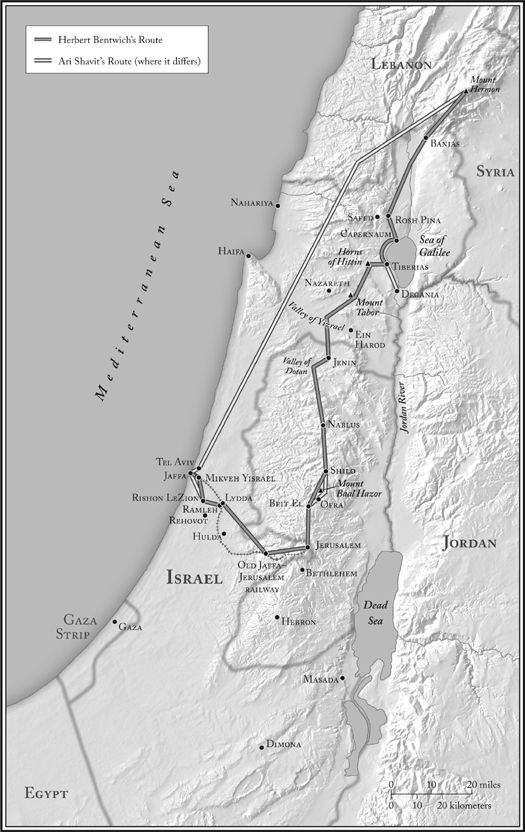
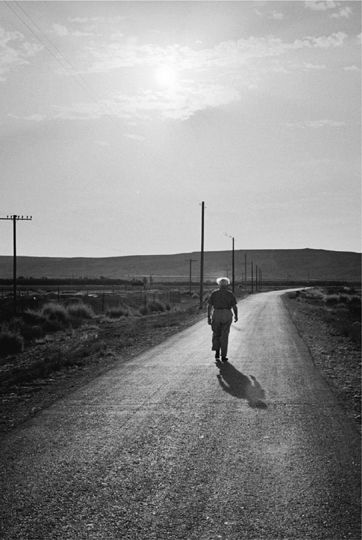
()
F OR AS LONG AS I CAN REMEMBER , I REMEMBER FEAR . E XISTENTIAL FEAR . The Israel I grew up inthe Israel of the mid-1960swas energetic, exuberant, and hopeful. But I always felt that beyond the well-to-do houses and upper-middle-class lawns of my hometown lay a dark ocean. One day, I dreaded, that dark ocean would rise and drown us all. A mythological tsunami would strike our shores and sweep my Israel away. It would become another Atlantis, lost in the depths of the sea.
One morning in June 1967, when I was nine years old, I came upon my father shaving in the bathroom. I asked him if the Arabs were going to win. Would the Arabs conquer our Israel? Would they really throw us all into the sea? A few days later the Six Day War began.
In October 1973, the sirens of imminent disaster began to wail. I was in bed with the flu in the late noon of that silent Yom Kippur as F-4 jets tore through the sky. They were flying 500 feet above our roof en route to the Suez Canal to fend off the invading Egyptian forces that took Israel by surprise. Many of them never returned. I was sixteen years old, and I was petrified as the news came in of the collapse of our defenses in the Sinai desert and the Golan Heights. For ten terrifying days it seemed that my primordial fears were justified. Israel was in peril. The walls of the third Jewish temple were shaking.
In January 1991, the first Gulf War broke out. Tel Aviv was bombarded by Iraqi SCUD missiles. There was some concern regarding a possible chemical weapons attack. For weeks, Israelis carried their gas mask kits with them everywhere they went. Occasionally, when a warning sounded that a warhead was on its way, we shut ourselves in sealed rooms with the masks on our faces. Although it turned out that the threat was not real, there was something horrific about this surreal ritual. I listened closely to the sounds of sirens and looked with dismay at the terrified eyes of my loved ones locked in German-made gas masks.
In March 2002, a wave of terror rattled Israel. Hundreds died as Palestinian suicide bombers attacked buses, nightclubs, and shopping malls. As I was writing in my Jerusalem study one night, I heard a loud boom. It had to be our neighborhood pub, I realized. I grabbed my writing pad and ran up the street. Three handsome young men were sitting at the bar in front of their half-full beer mugsdead. A petite young woman was lying in a cornerlifeless. Those who were only wounded were screaming and crying. As I looked at the hell around me in the glowing lights of the blown-up pub, the journalist I now was asked, What will be? How long can we sustain this lunacy? Will there come a time when the vitality we Israelis are known for will surrender to the forces of death attempting to annihilate us?
The decisive victory in the 1967 war dissipated the prewar fears. The recovery of the 1970s and 1980s healed the deep wound of 1973. The peace process of the 1990s mended the trauma of 1991. The prosperity of the late 2000s glossed over the horror of 2002. Precisely because we are shrouded in uncertainty, we Israelis insist on believing in ourselves, in our nation-state, and in our future. But throughout the years, my own muted fear never went away. To discuss or express this fear was taboo, yet it was with me wherever I went. Our cities seemed to be built on shifting sand. Our houses never seemed quite stable. Even as my nation grew stronger and wealthier, I felt it was profoundly vulnerable. I realized how exposed we are, how constantly intimidated. Yes, our life continues to be intense and rich and in many ways happy. Israel projects a sense of security that emanates from its physical, economic, and military success. The vitality of our daily life is astonishing. And yet there is always the fear that one day daily life will freeze like Pompeiis. My beloved homeland will crumble as enormous Arab masses or mighty Islamic forces overcome its defenses and eradicate its existence.
For as long as I can remember, I remember occupation. Only a week after I asked my father whether the Arab nations were going to conquer Israel, Israel conquered the Arab-populated regions of the West Bank and Gaza. A month later, my parents, my brother, and I embarked on a first family tour of the occupied cities of Ramallah, Bethlehem, and Hebron. Wherever we went, there were remains of burned Jordanian jeeps, trucks, and military vehicles. White flags of surrender hung over most houses. Some streets were blocked with the mangled, blackened carcasses of fancy Mercedes automobiles that had been run over by the treads of Israeli tanks. Palestinian children my age and younger had fear in their eyes. Their parents appeared devastated and humiliated. Within a few weeks the mighty Arabs were transformed into victims, while the endangered Israelis became conquerors. The Jewish state was now triumphant and proud and drunk with a heady sense of power.
When I was a teenager, everything was still fine. The common wisdom was that ours was a benevolent military occupation. Modern Israel brought progress and prosperity to the Palestinian regions. Now our backward neighbors had the electricity and running water and health care they never had before. They had to realize that they had never had it so good. They were surely grateful for all that we bestowed upon them. And when peace came, we would hand back most of the occupied territories. But for the time being, all was well in the Land of Israel. Arab and Jew coexisted throughout the country, enjoying calm and plenty.
Only when I was a soldier did I grasp that something was wrong. Six months after joining the elite paratrooper brigade of the IDF, I was posted in the very same occupied cities that I had toured as a child ten years earlier. Now I was assigned to do the dirty work: checkpoint duties, house arrests, violent dispersal of demonstrations. What traumatized me most was breaking into homes and taking young men from their warm beds to midnight interrogations. What the hell was going on, I asked myself. Why was I defending my homeland by tyrannizing civilians who were deprived of their rights and freedom? Why was my Israel occupying and oppressing another people?
Font size:
Interval:
Bookmark:
Similar books «My Promised Land: The Triumph and Tragedy of Israel»
Look at similar books to My Promised Land: The Triumph and Tragedy of Israel. We have selected literature similar in name and meaning in the hope of providing readers with more options to find new, interesting, not yet read works.
Discussion, reviews of the book My Promised Land: The Triumph and Tragedy of Israel and just readers' own opinions. Leave your comments, write what you think about the work, its meaning or the main characters. Specify what exactly you liked and what you didn't like, and why you think so.


